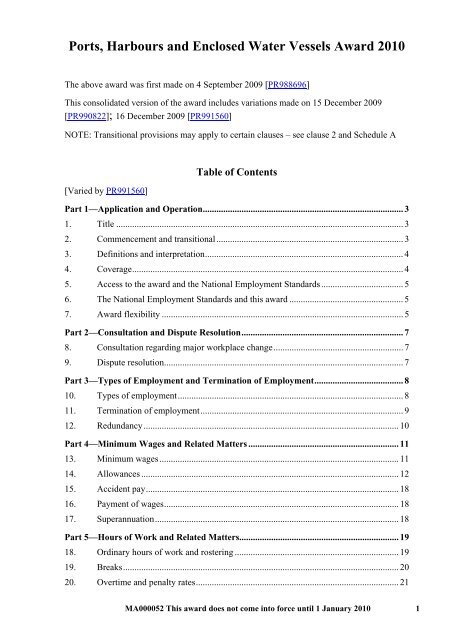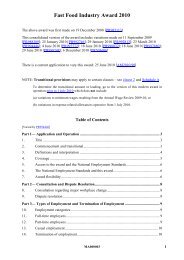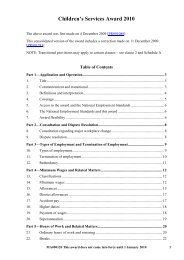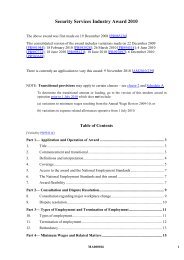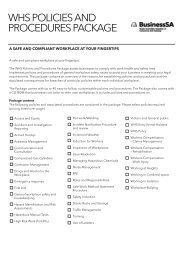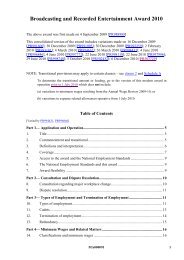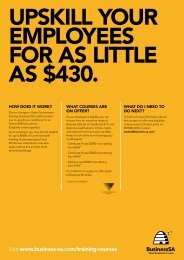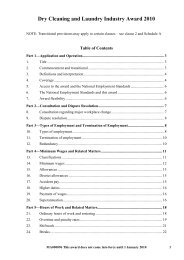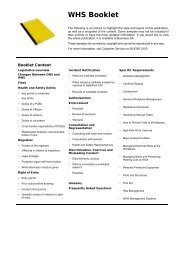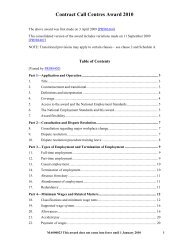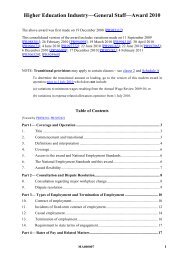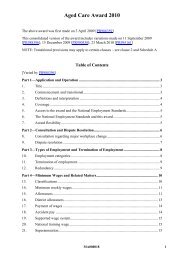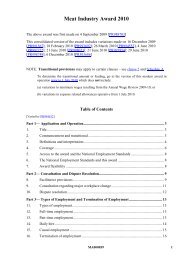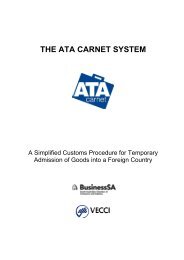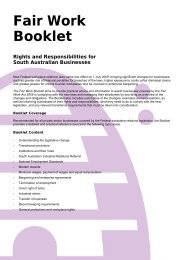Ports, Harbours and Enclosed Water Vessels Award ... - Business SA
Ports, Harbours and Enclosed Water Vessels Award ... - Business SA
Ports, Harbours and Enclosed Water Vessels Award ... - Business SA
You also want an ePaper? Increase the reach of your titles
YUMPU automatically turns print PDFs into web optimized ePapers that Google loves.
12.5 Transitional provisions<strong>Ports</strong>, <strong>Harbours</strong> <strong>and</strong> <strong>Enclosed</strong> <strong>Water</strong> <strong>Vessels</strong> <strong>Award</strong> 2010(a)Subject to clause 12.5(b), an employee whose employment is terminated by anemployer is entitled to redundancy pay in accordance with the terms of anotional agreement preserving a State award:(i)(ii)that would have applied to the employee immediately prior to 1 January2010, if the employee had at that time been in their current circumstancesof employment <strong>and</strong> no agreement made under the Workplace RelationsAct 1996 (Cth) had applied to the employee; <strong>and</strong>that would have entitled the employee to redundancy pay in excess of theemployee’s entitlement to redundancy pay, if any, under the NES.(b)(c)The employee’s entitlement to redundancy pay under the notional agreementpreserving a State award is limited to the amount of redundancy pay whichexceeds the employee’s entitlement to redundancy pay, if any, under the NES.This clause does not operate to diminish an employee’s entitlement toredundancy pay under any other instrument.(d) This clause ceases to operate on 31 December 2014.Part 4—Minimum Wages <strong>and</strong> Related Matters13. Minimum wages13.1 The minimum rates for each classification will be:ClassificationMinimum weekly rateMaster 751.30Mate 714.40Engineer 714.40General Purpose H<strong>and</strong>, Deckh<strong>and</strong>, Greaser, PassengerAttendant, Turnstile Attendant, Boating Attendant,Host, Fireman, Trimmer, Linesman, Cook, Sailor,Able Seaman, Leading H<strong>and</strong>$674.70Shipkeeper 616.30Crane Driver (under 20 tonnes) 627.70Crane Driver (over 20 tonnes) 693.80MA000052 This award does not come into force until 1 January 2010 11
14. Allowances14.1 Bedding <strong>and</strong> other utensils<strong>Ports</strong>, <strong>Harbours</strong> <strong>and</strong> <strong>Enclosed</strong> <strong>Water</strong> <strong>Vessels</strong> <strong>Award</strong> 2010(a)(b)When vessels are away during the night, the employer will supply a mattress,two blankets, two sheets, one pillow, one pillow slip, towel, soap, eatingutensils, washing cloths <strong>and</strong> drying towels. Laundering to be the responsibilityof the employer.On termination of employment an employee will be required to return to theemployer all articles on issue to them.14.2 Charge h<strong>and</strong>s(a)Charge h<strong>and</strong>s will be paid an allowance of 3.26% of the st<strong>and</strong>ard rate perweek. Charge h<strong>and</strong>s not directly supervised by a foreman in the allocation ofduties to employees will be paid an allowance of 4.85% of the st<strong>and</strong>ard rate perweek.14.3 Distant work(a)(b)A relieving employee other than a casual employee who is required to work ata place away from their normal place of work will be paid all additional faresinvolved <strong>and</strong> additional travelling time involved at the rate of single time;provided that no employee will be paid more than their ordinary day’s wagesfor any time not exceeding 24 hours spent travelling.A relieving employee including a casual employee who is temporarilytransferred to a locality to carry out relieving duties, where it is necessary tosleep away from their home, will be provided with reasonable board <strong>and</strong>lodging or paid an allowance of 56.23% of the st<strong>and</strong>ard rate per week of sevendays. In the case of broken parts of a week, the allowance will be all livingexpenses actually <strong>and</strong> reasonably incurred but not exceeding the rate of 8.00%of the st<strong>and</strong>ard rate per day.14.4 Dual capacity allowanceAn employee who is a holder of a Certificate of Competency as a Marine MotorEngineer will be paid an allowance of 0.58% of the st<strong>and</strong>ard rate for each day or partof a day during which they are required to use such a certificate. The allowanceprescribed by this subclause will, when paid, be deemed to be part of the ordinaryrate of wages for the purpose of calculating overtime, annual leave, sick leave <strong>and</strong>long service leave.14.5 Protective clothingOn request an employee will be supplied by the employer with an oilskin,sou’wester, sea boots, overalls, gloves, hard hats, sunscreen lotion, safety glasses,safety shoes, sunglasses <strong>and</strong> ear protection devices for their own use when it isreasonably necessary to wear such protective clothing.14.6 UniformsWhere employees are required to wear uniforms, these will be provided by theemployer at no cost to the employee or, instead thereof, the employer will pay to the12 MA000052 This award does not come into force until 1 January 2010
<strong>Ports</strong>, <strong>Harbours</strong> <strong>and</strong> <strong>Enclosed</strong> <strong>Water</strong> <strong>Vessels</strong> <strong>Award</strong> 2010employee the sum of 2.01% of the st<strong>and</strong>ard rate. Such uniforms will be laundered bythe employer.14.7 Compensation for loss of personal effectsIf in the course of employment an employee should sustain damage to or loss of theirpersonal effects by fire, explosion, foundering, shipwreck, collision, str<strong>and</strong>ing oraccident <strong>and</strong> where such damage was not caused by the employee’s own wilfulneglect or fault or where such articles are lost through breaking or entering whilstsecurely stored at the employer’s direction in a room or building on the employer’spremises, vessel or work shop, the employer will compensate the employee to theextent of the damage or loss to a maximum of 210.30% of the st<strong>and</strong>ard rate.14.8 Dirty work(a)(b)An employee called upon to perform work which is more dirty or offensivethan would normally apply will be paid an additional 0.07% of the st<strong>and</strong>ardrate per hour for the time spent on such work.Provided that, instead of the above allowance, for all work an employee isrequired to perform alongside vessels in discharging alumina, petroleum, coke,sulphur, anhydrous ammonia <strong>and</strong> all phosphates, the employee will be paid anallowances of 0.18% of the st<strong>and</strong>ard rate per hour. Such employee will beeligible for this payment from the time the barge ties up to the vessel until thetime it returns to its berth at the completion of the bunker.14.9 Wet work(a)(b)Any employee working in water or wet places will be paid an extra allowanceof 0.03% of the st<strong>and</strong>ard rate per hour.Wet places mean places where, in the performance of the work, the splashingof water or mud saturates the employee’s clothing, or where protection is notprovided to prevent splashing or dripping sufficient to saturate their clothing,<strong>and</strong> will include wet material or wet ground in which it is impracticable for theemployee wearing ordinary working boots to work without getting wet feet.Provided this clause will not apply to employees working on natural surfacemade wet by rain.14.10 Unloading <strong>and</strong> loading garbage allowanceAn employee called upon to work at loading or unloading garbage <strong>and</strong> or ashes orother like material will be paid an allowance of 0.07% of the st<strong>and</strong>ard rate per hour.14.11 Slipway etc. allowanceA junior employee called to work on slipways, cleaning, scraping, painting oroverhauling launches, barges, punts or any other floating plant will be paid anallowance of 0.08% of the st<strong>and</strong>ard rate per hour.14.12 Bilge allowanceAn employee required to work in the bilges will be paid an allowance of 0.11% ofthe st<strong>and</strong>ard rate per hour.MA000052 This award does not come into force until 1 January 2010 13
14.13 Chipping hammers<strong>Ports</strong>, <strong>Harbours</strong> <strong>and</strong> <strong>Enclosed</strong> <strong>Water</strong> <strong>Vessels</strong> <strong>Award</strong> 2010Employees using electric or pneumatic chipping hammers, wire brushing machine<strong>and</strong> s<strong>and</strong>blasting machine will be paid at the rate of 0.01% of the st<strong>and</strong>ard rate perhour in addition to any other ordinary or overtime rate for the time so occupied.Where a chipping hammer is being used in a confined space, suitable ventilation willbe installed, if practicable, before work commences.14.14 ExpensesThe employer will reimburse an employee any expenses reasonably incurred by themin the service or interest of the employer, provided the employee is able to provesuch expense by way of receipts.14.15 First aidAn employee on becoming qualified as the holder of appropriate first aidqualifications such as a certificate from the St John Ambulance or its equivalent, <strong>and</strong>who is required by the employer to perform first aid duty will be paid an allowanceof 1.70% of the st<strong>and</strong>ard rate per week.14.16 Loading <strong>and</strong> discharge of cargo <strong>and</strong> suppliesAn employee directed by the employer to load or discharge cargo including personalbelongings of passengers, foodstuffs, beverages, or laundry, will be paid allowancesas set out below when so engaged.(a)On vessels including barges <strong>and</strong> l<strong>and</strong>ing craft transporting passengers <strong>and</strong>cargo including fuel <strong>and</strong> or water <strong>and</strong> roll on/roll off cargoes between themainl<strong>and</strong> <strong>and</strong> isl<strong>and</strong> resorts:(i)(ii)2.99% of the st<strong>and</strong>ard rate per week of five working days; <strong>and</strong>where an employee is so engaged in any week in excess of five days theywill be paid an additional 0.61% of the st<strong>and</strong>ard rate per day.(b)(c)(d)(e)On vessels (including barges <strong>and</strong> l<strong>and</strong>ing craft) transporting cargo onlybetween the mainl<strong>and</strong> <strong>and</strong> isl<strong>and</strong> resorts or between isl<strong>and</strong> resorts 5.23% of thest<strong>and</strong>ard rate per trip.On vessels engaged in overnight cruises one to six nights 2.01% of the st<strong>and</strong>ardrate per trip.On vessels engaged in overnight cruises over six nights 3.00% of the st<strong>and</strong>ardrate per trip.Provided that:(i)(ii)an additional amount will not be payable where the loading or dischargeis restricted to ships stores, fuel <strong>and</strong> or water cargoes, incidental personalbelongings of passengers, or other items required on board exclusivelyfor a day cruise; <strong>and</strong>an employee may be required to supervise the loading or discharge(including roll on/roll off cargoes) where such work is part of theirnormal duties, without additional payment.14 MA000052 This award does not come into force until 1 January 2010
14.17 Meal allowances<strong>Ports</strong>, <strong>Harbours</strong> <strong>and</strong> <strong>Enclosed</strong> <strong>Water</strong> <strong>Vessels</strong> <strong>Award</strong> 2010When an employee who is required to work overtime in excess of one <strong>and</strong> a halfhours after the usual ceasing time, without being notified the previous day, theemployee will be provided with a suitable meal or be paid $12.90 instead. Shouldsuch overtime work continue for a further four hours, the employee will be providedwith a second meal or be paid $12.90.14.18 Waiting ordersAn employee who is required by their employer to telephone for orders will:(a)(b)if an employee has a telephone installed at their home, be paid the annual rentalof such telephone plus 16.51% of the st<strong>and</strong>ard rate per year for callsnecessarily incurred by the employee for ringing for such orders. If theemployee is required by their employer to have a phone installed, theinstallation fee will be paid by the employer; oran off-duty employee required to ring for orders other than on a phoneprovided totally or in part by the employer, will receive an allowance of 0.42%of the st<strong>and</strong>ard rate for each call.14.19 ToolsWhere employees are required to provide <strong>and</strong> use their own tools the employer willbe responsible for the replacement of such tools broken, worn out, lost or stolen inthe course of employment.14.20 Towing(a)(b)(c)Employees on any vessel either towing or carrying explosives will be paid anadditional 0.29% of the st<strong>and</strong>ard rate for each day or part thereof while soengaged. This rate will be treated as part of the wages for all purposes of thisaward. For the purposes of this subclause, explosives means any material usedas an explosive, such as gunpowder, blasting powder or materials, or any othermaterial of like nature, but does not include petroleum products.Masters engaged in towing non self-propelled bunker barges having a carryingcapacity of 400 tonnes or more, will be paid an additional amount of 0.27% ofthe st<strong>and</strong>ard rate for each day or part thereof while so engaged. Provided thatmoving such bunker barges at terminal points is not regarded as towing withinthis provision. This rate will be treated as part of the wages for all purposes ofthis award.Employees on vessels proceeding beyond the limits of a harbour, river or baywill whilst so engaged be paid their normal wage plus an allowance of 25% oftheir normal wage for each day with a minimum payment for four hours.14.21 Ships str<strong>and</strong>ed or wrecked or on fire(a)If a ship in the course of a voyage becomes wrecked or str<strong>and</strong>ed <strong>and</strong> theemployees are called on for special efforts while the ship is still wrecked orstr<strong>and</strong>ed they will, for the time during which they so assist, be paid 1.71% ofthe st<strong>and</strong>ard rate per hour.MA000052 This award does not come into force until 1 January 2010 15
<strong>Ports</strong>, <strong>Harbours</strong> <strong>and</strong> <strong>Enclosed</strong> <strong>Water</strong> <strong>Vessels</strong> <strong>Award</strong> 2010(b)(c)For the purposes of this clause a ship will be deemed to be wrecked if, while atsea, it is so disabled it becomes a dangerous crisis <strong>and</strong> unable for the timebeing to continue its voyage in the ordinary course of its operations.Where a ship grounds in a tidal river or harbour <strong>and</strong> is refloated by ordinarymeans, with or without cargo, <strong>and</strong> without special work such as laying outanchors <strong>and</strong> h<strong>and</strong>ling hawsers being required of the employees, it will not bedeemed to be wrecked or str<strong>and</strong>ed within the meaning of clause 14.21(b).14.22 Transport(a)Where an employee commences or finishes work or is required for call-outbetween the hours of 11.00 pm <strong>and</strong> 6.00 am the employer will:(i)(ii)supply them with a conveyance to or from their home whichever isappropriate;pay them for time spent in reaching their home or travelling there from atthe employee’s minimum weekly rate with a minimum of half an hour<strong>and</strong> a maximum of one hour; or(iii) if by arrangement with their employer the employee uses their own motorvehicle they will receive an allowance of not less than $0.74 perkilometre.(b)(c)An employee required to use their own vehicle to travel to or from a starting orfinishing point other than their regular starting or finishing point will be paidfor the distance <strong>and</strong> time in excess of the distance or time involved in getting totheir normal starting or finishing point, $0.74 per kilometre for the excessdistance travelled <strong>and</strong> will be paid at their minimum weekly rate for the excesstime occupied in travelling with a minimum of half an hour <strong>and</strong> a maximum ofone hour.An employee not required to use their own motor vehicle <strong>and</strong> should in theordinary course of employment begin their work for the day at a particularplace, is required to finish work at a place other than that particular place willbe paid any reasonable travelling expenses <strong>and</strong> will also be paid at overtimerates of pay for any travelling time occasioned beyond their ordinary travellingtime.14.23 Travelling to another port(a)(b)(c)When an employee is required to travel from their home port to another port,time spent outside of their ordinary hours will be paid for as travelling time.The rate of pay for travelling time will be ordinary rates, except on Sundays<strong>and</strong> public holidays when it will be time <strong>and</strong> a half.The maximum travelling time to be paid for will be eight hours on any one day.14.24 Travelling expensesWhere an employee is required to join or leave a vessel at a place other than theirplace of engagement, they will be entitled to a free passage <strong>and</strong> to be reimbursed allout of pocket expenses reasonably incurred by them. The free passage if by rail willbe first class <strong>and</strong> will include a sleeping berth when the train includes sleeping berth16 MA000052 This award does not come into force until 1 January 2010
<strong>Ports</strong>, <strong>Harbours</strong> <strong>and</strong> <strong>Enclosed</strong> <strong>Water</strong> <strong>Vessels</strong> <strong>Award</strong> 2010accommodation. The free passage if by air is to be in commercial aircraft, first classif available.14.25 Loading for duties outside normal workAn amount of 0.55% of the st<strong>and</strong>ard rate per day will be paid in excess of otherwages <strong>and</strong> allowances to employees, for each day they are required to perform theduties of diving to clean glass bottom boats or to clear obstructions from boatspropellers.14.26 Living away from home(a)(b)(c)(d)Whilst away from the vessel’s home port, an employer will provide theemployee with proper meals <strong>and</strong> accommodation <strong>and</strong> be responsible forpayment of reasonable expenses actually incurred for such meals <strong>and</strong>accommodation ashore.Whilst at sea, every employee will be provided with proper meals, attendance,bedding <strong>and</strong> soap, <strong>and</strong> be supplied once a week with clean bed linen <strong>and</strong> twicea week with clean towels. The employer will be responsible for the launderingof linen <strong>and</strong> towels.Where it is the employer’s responsibility to provide the employee with propermeals <strong>and</strong> accommodation ashore, <strong>and</strong> the employer fails to do so, theemployer will reimburse the employee for all costs incurred in relation tonormal meals <strong>and</strong> charges incurred for a good st<strong>and</strong>ard of accommodation.Tea, sugar, milk <strong>and</strong> coffee will be provided on all vessels for employees at theemployer’s expense.14.27 Higher dutiesAn employee engaged for more than two hours during one day on duties carrying ahigher rate than their ordinary classification will be paid the higher rate for such day.If engaged for two hours or less during one day they will be paid the higher rate forthe time so worked.14.28 Adjustment of expense related allowances(a)(b)At the time of any adjustment to the st<strong>and</strong>ard rate, each expense relatedallowance will be increased by the relevant adjustment factor. The relevantadjustment factor for this purpose is the percentage movement in the applicableindex figure most recently published by the Australian Bureau of Statisticssince the allowance was last adjusted.The applicable index figure is the index figure published by the AustralianBureau of Statistics for the Eight Capitals Consumer Price Index (Cat No.6401.0), as follows:AllowanceMeal allowanceVehicle allowanceApplicable Consumer Price Index figureTake away <strong>and</strong> fast foods sub-groupPrivate motoring sub-groupMA000052 This award does not come into force until 1 January 2010 17
15. Accident pay<strong>Ports</strong>, <strong>Harbours</strong> <strong>and</strong> <strong>Enclosed</strong> <strong>Water</strong> <strong>Vessels</strong> <strong>Award</strong> 201015.1 Subject to clause 15.2, an employee is entitled to accident pay in accordance with theterms of:(a)(b)a notional agreement preserving a State award that would have applied to theemployee immediately prior to 1 January 2010 or an award made under theWorkplace Relations Act 1996 (Cth) that would have applied to the employeeimmediately prior to 27 March 2006, if the employee had at that time been intheir current circumstances of employment <strong>and</strong> no agreement made under theWorkplace Relations Act 1996 (Cth) had applied to the employee; <strong>and</strong>that would have entitled the employee to accident pay in excess of theemployee’s entitlement to accident pay, if any, under any other instrument.15.2 The employee’s entitlement to accident pay under the notional agreement preservinga State award or the award is limited to the amount of accident pay which exceedsthe employee’s entitlement to accident pay, if any, under any other instrument.15.3 This clause does not operate to diminish an employee’s entitlement to accident payunder any other instrument.15.4 This clause ceases to operate on 31 December 2014.16. Payment of wagesWages will be paid weekly or fortnightly. Wages may be paid by cash or electronic fundstransfer (EFT).17. Superannuation[Varied by PR990822]17.1 Superannuation legislation(a) Superannuation legislation, including the Superannuation Guarantee(Administration) Act 1992 (Cth), the Superannuation Guarantee Charge Act1992 (Cth), the Superannuation Industry (Supervision) Act 1993 (Cth) <strong>and</strong> theSuperannuation (Resolution of Complaints) Act 1993 (Cth), deals with thesuperannuation rights <strong>and</strong> obligations of employers <strong>and</strong> employees. Undersuperannuation legislation individual employees generally have the opportunityto choose their own superannuation fund. If an employee does not choose asuperannuation fund, any superannuation fund nominated in the awardcovering the employee applies.(b)The rights <strong>and</strong> obligations in these clauses supplement those in superannuationlegislation.17.2 Employer contributionsAn employer must make such superannuation contributions to a superannuation fundfor the benefit of an employee as will avoid the employer being required to pay the18 MA000052 This award does not come into force until 1 January 2010
<strong>Ports</strong>, <strong>Harbours</strong> <strong>and</strong> <strong>Enclosed</strong> <strong>Water</strong> <strong>Vessels</strong> <strong>Award</strong> 2010superannuation guarantee charge under superannuation legislation with respect tothat employee.17.3 Voluntary employee contributions(a)(b)(c)Subject to the governing rules of the relevant superannuation fund, anemployee may, in writing, authorise their employer to pay on behalf of theemployee a specified amount from the post-taxation wages of the employeeinto the same superannuation fund as the employer makes the superannuationcontributions provided for in clause 17.2.An employee may adjust the amount the employee has authorised theiremployer to pay from the wages of the employee from the first of the monthfollowing the giving of three months’ written notice to their employer.The employer must pay the amount authorised under clauses 17.3(a) or (b) nolater than 28 days after the end of the month in which the deduction authorisedunder clauses 17.3(a) or (b) was made.17.4 Superannuation fundUnless, to comply with superannuation legislation, the employer is required to makethe superannuation contributions provided for in clause 17.2 to anothersuperannuation fund that is chosen by the employee, the employer must make thesuperannuation contributions provided for in clause 17.2 <strong>and</strong> pay the amountauthorised under clauses 17.3(a) or (b) to one of the following superannuation funds:(a)Maritime Super;[17.4(b) substituted by PR990822](b)(c)AMP Superannuation Savings Trust; orany superannuation fund to which the employer was making superannuationcontributions for the benefit of its employees before 12 September 2008,provided the superannuation fund is an eligible choice fund.Part 5—Hours of Work <strong>and</strong> Related Matters18. Ordinary hours of work <strong>and</strong> rostering18.1 This clause supplements Division 3 of the NES which deals with maximum weeklyhours.18.2 Span of hoursOrdinary hours may be worked between 6.00 am <strong>and</strong> 6.00 pm for up to eight hoursper day, Monday to Friday inclusive.18.3 RosteringRostered days off will be so arranged that in each week two of such days will beconsecutive except where the employer <strong>and</strong> the employee agree otherwise.MA000052 This award does not come into force until 1 January 2010 19
<strong>Ports</strong>, <strong>Harbours</strong> <strong>and</strong> <strong>Enclosed</strong> <strong>Water</strong> <strong>Vessels</strong> <strong>Award</strong> 201018.4 Avoidance of physical exhaustion(a)(b)(c)An employee who has been on duty continuously, including meal breaks, formore than 18 hours will not be required by their employer to continue dutyuntil they have had, for the purpose of rest, a period of 10 hours off duty.Should an employee work at the request of the employer after they have beenon duty continuously, including meal breaks for more than 18 hours, they willbe entitled to be paid at the rate of double time for the period of such duty inaddition to any other payment due to them until such time as the 10 hours’respite from duty commences.Employees will receive their full weekly rate notwithst<strong>and</strong>ing any rest periodoccurring in ordinary working hours.19. Breaks19.1 An employee will not be required to work for more than five hours without a breakfor a meal.(a)BreakfastBreakfast is the hour proceeding the usual starting time. The breakfast breakwill not be taken when employees are required to commence at 7.00 am orafter, <strong>and</strong> proceeding the usual starting time.(i)(ii)By mutual agreement between the employer <strong>and</strong> employees concerned, a20 minutes rest period may be taken without deduction of pay instead ofthe prescribed hour for breakfast. This rest period will commence20 minutes before the usual starting time unless otherwise mutuallyagreed.Employees ordered in to dock or shift a vessel at 7.00 am will not beentitled to a meal break before noon, but if ordered in at any time before7.00 am they will have an hour for breakfast not later than 8.00 am or arest period of 20 minutes as provided above.(b)LunchLunch is from noon to 12.45 pm or such period as is the usual custom of theestablishment at which the employees are employed.(c)TeaTea is from 5.00 pm to 6.00 pm or according to the usual custom of theestablishment at which the employees are employed. Provided that by mutualagreement between the employer <strong>and</strong> employee concerned a rest period may betaken.The times prescribed above may be altered by mutual agreement between theemployer <strong>and</strong> employee concerned.19.2 Double time will be paid for all work done during the breakfast, lunch <strong>and</strong> tea breaksspecified above, such double time to continue until the employees are granted a mealbreak or are released from duty. This provision has no application to establishments20 MA000052 This award does not come into force until 1 January 2010
<strong>Ports</strong>, <strong>Harbours</strong> <strong>and</strong> <strong>Enclosed</strong> <strong>Water</strong> <strong>Vessels</strong> <strong>Award</strong> 2010or jobs where, in accordance with this clause, it is customary for paid rest periods tobe taken instead of the breakfast <strong>and</strong> or tea breaks, <strong>and</strong> such rest periods are allowed<strong>and</strong> taken.20. Overtime <strong>and</strong> penalty rates20.1 Employees will be entitled to be paid:(a)(b)(c)a loading of 50% of the ordinary hourly base rate of pay for the first threehours, <strong>and</strong> 100% the ordinary hourly base rate of pay thereafter for any timeworked outside of ordinary hours on a Monday to Friday, except for publicholidays;a loading of 50% of the ordinary hourly base rate of pay for all ordinary hours<strong>and</strong> overtime worked between midnight Friday <strong>and</strong> midnight Saturday; <strong>and</strong>a minimum of four hours if recalled to work overtime after leaving theemployer’s premises.20.2 Time off instead of overtime payment(a)(b)An employee may elect, with the consent of the employer, to take time offinstead of payment for overtime at a time or times agreed with the employer.The employee may take one hour of time off for each hour of overtime, paid atthe employee’s ordinary hourly base rate of pay.20.3 Sunday workAn employee will be paid a loading of 100% of the ordinary hourly base rate of payfor any hours, ordinary <strong>and</strong> overtime, worked on a Sunday.20.4 Public holidaysAn employee will be paid a loading of 150% of the ordinary hourly base rate of pay,or any hours, ordinary <strong>and</strong> overtime, worked on a public holiday.21. Shiftwork21.1 The following shifts may be worked:(a)(b)(c)(d)afternoon shift means any shift finishing after 6.00 pm <strong>and</strong> at or beforemidnight;continuous work means work carried on with consecutive shifts of employeesthroughout the 24 hours of each of at least six consecutive days withoutinterruption except during breakdowns or meal breaks or due to unavoidablecauses beyond the control of the employer;night shift means any shift finishing subsequent to midnight <strong>and</strong> at or before8.00 am;permanent night shift employee means an employee who:(i)during a period of engagement on shift, works night shift only;MA000052 This award does not come into force until 1 January 2010 21
<strong>Ports</strong>, <strong>Harbours</strong> <strong>and</strong> <strong>Enclosed</strong> <strong>Water</strong> <strong>Vessels</strong> <strong>Award</strong> 2010(ii)remains on night shift for a period longer than four consecutive weeks; or(iii) works on a night shift which does not rotate or alternate with anothershift or with day work so as to give them at least one third of theirworking time off night shift in each shift cycle will during suchengagement period or cycle.21.2 Shiftwork ratesType of shiftPercentage of the ordinary time rate%Afternoon shift 115Night shift 115Permanent night shift 130Part 6—Leave <strong>and</strong> Public Holidays22. Annual leave22.1 The following provisions supplement the NES.22.2 Annual leave loadingA loading of 17.5% (20% for shiftworkers) is payable in additional to the paymentfor the leave.22.3 ShiftworkersFor the purpose of Division 6 of the NES a shiftworker is an employee employed onshiftwork where three shifts per day are worked over a period of seven days per weekor an employee regularly rostered to work on Sundays <strong>and</strong> public holidays.22.4 Requirement to take annual leaveAnnual leave must be taken within six months of the entitlement accruing. Anemployer may require an employee to take a period of annual provided the employeeis given at least 14 days notice.23. Personal/carer’s leave <strong>and</strong> compassionate leavePersonal/carer’s leave <strong>and</strong> compassionate leave are provided for in the NES.24. Community service leaveCommunity service leave is provided for in the NES.25. Public holidays25.1 Public holidays are provided for in the NES.22 MA000052 This award does not come into force until 1 January 2010
<strong>Ports</strong>, <strong>Harbours</strong> <strong>and</strong> <strong>Enclosed</strong> <strong>Water</strong> <strong>Vessels</strong> <strong>Award</strong> 201025.2 An employee will be paid at the rate of double time <strong>and</strong> a half with a minimum offour hours work when required to work on a public holiday.MA000052 This award does not come into force until 1 January 2010 23
<strong>Ports</strong>, <strong>Harbours</strong> <strong>and</strong> <strong>Enclosed</strong> <strong>Water</strong> <strong>Vessels</strong> <strong>Award</strong> 2010Schedule A—Transitional Provisions[Sched A inserted by PR991560]A.1 GeneralA.1.1A.1.2The provisions of this schedule deal with minimum obligations only.The provisions of this schedule are to be applied:(a)(b)(c)(d)when there is a difference, in money or percentage terms, between a provisionin a relevant transitional minimum wage instrument (including the transitionaldefault casual loading) or award-based transitional instrument on the one h<strong>and</strong><strong>and</strong> an equivalent provision in this award on the other;when a loading or penalty in a relevant transitional minimum wage instrumentor award-based transitional instrument has no equivalent provision in thisaward;when a loading or penalty in this award has no equivalent provision in arelevant transitional minimum wage instrument or award-based transitionalinstrument; orwhen there is a loading or penalty in this award but there is no relevanttransitional minimum wage instrument or award-based transitional instrument.A.2 Minimum wages – existing minimum wage lowerA.2.1The following transitional arrangements apply to an employer which, immediatelyprior to 1 January 2010:(a)(b)(c)was obliged,but for the operation of an agreement-based transitional instrument or anenterprise agreement would have been obliged, orif it had been an employer in the industry or of the occupations covered by thisaward would have been obligedby a transitional minimum wage instrument <strong>and</strong>/or an award-based transitionalinstrument to pay a minimum wage lower than that in this award for anyclassification of employee.A.2.2In this clause minimum wage includes:(a)(b)(c)a minimum wage for a junior employee, an employee to whom trainingarrangements apply <strong>and</strong> an employee with a disability;a piecework rate; <strong>and</strong>any applicable industry allowance.A.2.3Prior to the first full pay period on or after 1 July 2010 the employer must pay no lessthan the minimum wage in the relevant transitional minimum wage instrument <strong>and</strong>/oraward-based transitional instrument for the classification concerned.24 MA000052 This award does not come into force until 1 January 2010
<strong>Ports</strong>, <strong>Harbours</strong> <strong>and</strong> <strong>Enclosed</strong> <strong>Water</strong> <strong>Vessels</strong> <strong>Award</strong> 2010A.2.4A.2.5A.2.6A.2.7The difference between the minimum wage for the classification in this award <strong>and</strong>the minimum wage in clause A.2.3 is referred to as the transitional amount.From the following dates the employer must pay no less than the minimum wage forthe classification in this award minus the specified proportion of the transitionalamount:First full pay period on or after1 July 2010 80%1 July 2011 60%1 July 2012 40%1 July 2013 20%The employer must apply any increase in minimum wages in this award resultingfrom an annual wage review.These provisions cease to operate from the beginning of the first full pay period on orafter 1 July 2014.A.3 Minimum wages – existing minimum wage higherA.3.1The following transitional arrangements apply to an employer which, immediatelyprior to 1 January 2010:(a)(b)(c)was obliged,but for the operation of an agreement-based transitional instrument or anenterprise agreement would have been obliged, orif it had been an employer in the industry or of the occupations covered by thisaward would have been obligedby a transitional minimum wage instrument <strong>and</strong>/or an award-based transitionalinstrument to pay a minimum wage higher than that in this award for anyclassification of employee.A.3.2In this clause minimum wage includes:(a)(b)(c)a minimum wage for a junior employee, an employee to whom trainingarrangements apply <strong>and</strong> an employee with a disability;a piecework rate; <strong>and</strong>any applicable industry allowance.A.3.3A.3.4Prior to the first full pay period on or after 1 July 2010 the employer must pay no lessthan the minimum wage in the relevant transitional minimum wage instrument <strong>and</strong>/oraward-based transitional instrument for the classification concerned.The difference between the minimum wage for the classification in this award <strong>and</strong>the minimum wage in clause A.3.3 is referred to as the transitional amount.MA000052 This award does not come into force until 1 January 2010 25
<strong>Ports</strong>, <strong>Harbours</strong> <strong>and</strong> <strong>Enclosed</strong> <strong>Water</strong> <strong>Vessels</strong> <strong>Award</strong> 2010A.3.5A.3.6A.3.7From the following dates the employer must pay no less than the minimum wage forthe classification in this award plus the specified proportion of the transitionalamount:First full pay period on or after1 July 2010 80%1 July 2011 60%1 July 2012 40%1 July 2013 20%The employer must apply any increase in minimum wages in this award resultingfrom an annual wage review. If the transitional amount is equal to or less than anyincrease in minimum wages resulting from the 2010 annual wage review thetransitional amount is to be set off against the increase <strong>and</strong> the other provisions ofthis clause will not apply.These provisions cease to operate from the beginning of the first full pay period on orafter 1 July 2014.A.4 Loadings <strong>and</strong> penalty ratesFor the purposes of this schedule loading or penalty means a:• casual or part-time loading;• Saturday, Sunday, public holiday, evening or other penalty;• shift allowance/penalty.A.5 Loadings <strong>and</strong> penalty rates – existing loading or penalty rate lowerA.5.1The following transitional arrangements apply to an employer which, immediatelyprior to 1 January 2010:(a)(b)(c)was obliged,but for the operation of an agreement-based transitional instrument or anenterprise agreement would have been obliged, orif it had been an employer in the industry or of the occupations covered by thisaward would have been obligedby the terms of a transitional minimum wage instrument or an award-basedtransitional instrument to pay a particular loading or penalty at a lower rate than theequivalent loading or penalty in this award for any classification of employee.A.5.2A.5.3Prior to the first full pay period on or after 1 July 2010 the employer must pay no lessthan the loading or penalty in the relevant transitional minimum wage instrument oraward-based transitional instrument for the classification concerned.The difference between the loading or penalty in this award <strong>and</strong> the rate inclause A.5.2 is referred to as the transitional percentage.26 MA000052 This award does not come into force until 1 January 2010
<strong>Ports</strong>, <strong>Harbours</strong> <strong>and</strong> <strong>Enclosed</strong> <strong>Water</strong> <strong>Vessels</strong> <strong>Award</strong> 2010A.5.4A.5.5From the following dates the employer must pay no less than the loading or penaltyin this award minus the specified proportion of the transitional percentage:First full pay period on or after1 July 2010 80%1 July 2011 60%1 July 2012 40%1 July 2013 20%These provisions cease to operate from the beginning of the first full pay period on orafter 1 July 2014.A.6 Loadings <strong>and</strong> penalty rates – existing loading or penalty rate higherA.6.1The following transitional arrangements apply to an employer which, immediatelyprior to 1 January 2010:(a)(b)(c)was obliged,but for the operation of an agreement-based transitional instrument or anenterprise agreement would have been obliged, orif it had been an employer in the industry or of the occupations covered by thisaward would have been obligedby the terms of a transitional minimum wage instrument or an award-basedtransitional instrument to pay a particular loading or penalty at a higher rate than theequivalent loading or penalty in this award, or to pay a particular loading or penalty<strong>and</strong> there is no equivalent loading or penalty in this award, for any classification ofemployee.A.6.2A.6.3A.6.4A.6.5Prior to the first full pay period on or after 1 July 2010 the employer must pay no lessthan the loading or penalty in the relevant transitional minimum wage instrument oraward-based transitional instrument.The difference between the loading or penalty in this award <strong>and</strong> the rate inclause A.6.2 is referred to as the transitional percentage. Where there is no equivalentloading or penalty in this award, the transitional percentage is the rate in A.6.2.From the following dates the employer must pay no less than the loading or penaltyin this award plus the specified proportion of the transitional percentage:First full pay period on or after1 July 2010 80%1 July 2011 60%1 July 2012 40%1 July 2013 20%These provisions cease to operate from the beginning of the first full pay period on orafter 1 July 2014.MA000052 This award does not come into force until 1 January 2010 27
<strong>Ports</strong>, <strong>Harbours</strong> <strong>and</strong> <strong>Enclosed</strong> <strong>Water</strong> <strong>Vessels</strong> <strong>Award</strong> 2010A.7 Loadings <strong>and</strong> penalty rates – no existing loading or penalty rateA.7.1A.7.2A.7.3A.7.4The following transitional arrangements apply to an employer not covered byclause A.5 or A.6 in relation to a particular loading or penalty in this award.Prior to the first full pay period on or after 1 July 2010 the employer need not pay theloading or penalty in this award.From the following dates the employer must pay no less than the followingpercentage of the loading or penalty in this award:First full pay period on or after1 July 2010 20%1 July 2011 40%1 July 2012 60%1 July 2013 80%These provisions cease to operate from the beginning of the first full pay period on orafter 1 July 2014.28 MA000052 This award does not come into force until 1 January 2010


